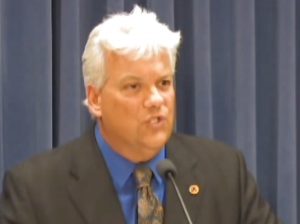Franks leaving Springfield stalemate for county board run
Jean Lotus — May 23, 2016
Jack Franks
State Rep. Jack Franks (D-63rd, Marengo) is telling the Illinois General Assembly “a pox on both your House–and Senate” and setting his sights on an election that’s closer to home – chairman of the McHenry County Board.
Franks, who’s consistently won elections since the 1990s in an otherwise Republican-leaning district, said he’s convinced the Democrats and Republicans in Springfield are equally to blame for the budget impasse.
“Both parties suffer from the delusion that it’s OK for real people to suffer as long as someone gets blamed,” he said. “Our schools are crumbling, our social services are closing and these guys don’t care. They only care about keeping power. And it’s never going to end.”
Franks is jumping into what is termed a “vacancy nomination.”

Michael J. Walkup
McHenry voters approved a referendum changing the board structure to an elected, rather than appointed chairman. Franks will face Commissioner Michael J. Walkup, who defeated the current chairman, Joseph Gottemoller in the April primary. Neither commissioner got back to the Chronicle before press time with a comment.
McHenry Democratic Committeeman Mike Bissett said his was one of the voices urging Franks to run for the 24-seat governing body, which is 100 percent Republican right now.
“Springfield is in total gridlock; worse than Washington,” Bissett said. “I and other people told him he can actually do something good here.”
Bissell hopes Franks might even have coattails for the “full slate of Democrats running in the next election.”
Franks is a popular politician who beat Harvard Republican Steven Reick in 2014. The district may well go Republican this time around. Reick is running for the seat again this election, and Franks has no idea who will run against him. “That’s up to the Democrats in the area to decide,” he said.
Reick issued a statement in mid-May: “Though I lost to him in 2014 and was prepared to go toe-to-toe with him in the fall, I was never running ‘against’ Jack Franks,” Reick said. “I was, and still am running for the things that I believe will make Illinois and McHenry County a better place to live, open a business and raise a family.”
Franks said he had to collect a minimum of 270 valid signatures of registered voters to run for the board. “When I was running for State Rep. I had to collect so many more, but I had a long time. Now I have 11 days.”
Franks has said he sees many of the problems in Illinois caused by waste and corruption. “The high taxes are driving people out of McHenry,” he said.
He’s been known to give blustery speeches at the statehouse about taxes and transparency. But he’s also wielded a powerful independent swing vote when the razor-thin Democratic majority can’t convince him to get on-board.
In an editorial last week, Reboot Illinois Editor Madeline Doubek called Franks, “One of the thorns in the legislative garden that needles just about everyone.”
Doubek claimed Franks managed to fizzle House Speaker Michael Madigan’s proposed progressive income tax by making it clear he would vote against it, denying Madigan the needed 71 votes.
Franks served on Rauner’s Task Force on the Consolidation of Local Government and Unfunded Mandates. Now he’s turning that scrutiny to the county board, which he thinks is an example of redundancy that costs taxpayer money.
Bissett, whose wife served on the county board at one point, said four commissioners for each district is overkill. He said more everyday citizens would participate if the board was trimmed down to 16 commissioners and had one per district.
“These district boundaries are so huge you have to spend $10,000-20,000 to run a race for the board,” Bissett said. That knocks out candidates who aren’t rich, he said.
Franks also thinks the board is expensive. He’s sponsoring a bill that will make part-time board members ineligible for taxpayer-paid pensions or health insurance.
Franks made no friends on the board when he showed up last January at the local newspapers with Illinois Municipal Retirement Fund Director Louis Kosiba to perform an informal audit of the trustees’ pension eligibility. Franks had not yet declared his candidacy to the board. County workers must work at least 1,000 hours per year to be eligible for pensions or insurance, according to an ordinance passed by the board in the 1990s.
Franks showed newspaper editors documents obtained under the Freedom of Information Act allegedly showing that some commissioners were not working the full 1,000 hours. A little over half of the 24 trustees have pension accounts.
Commissioners earn about $20,000 a year from the county and their pensions are vested after 10 years. Most have health insurance benefits, paid for by the county.
The board invited Kosiba to its March meeting and said the IMRF should fairly investigate every other board in Illinois and not single them out. Commissioners called Franks’ pension questioning a “stunt,” but then they did discuss the issue, according to the county’s audio recording archive.
“Are you serving on this board to get a pension?” asked one commissioner. “If we did take away your pensions, would you still want to be on this board?”
Franks has been an advocate of kicking lobbyists and non-government workers off the state pension rolls and he’s not the only one. In 2011, the Winnebago County Board voted to get rid of their own pensions. In March of this year, Cook County Commissioner Richard Boykin moved that board members give back their salaries. The motion died for lack of a second, but Boykin announced he would donate his salary to a scholarship.
Franks said he thinks the board can save tax money by reducing the size of the board and its districts and bring “accountability and transparency” to the county.
The county’s tax bite of about $76.2 million in 2015 was about 10 percent of the total property tax revenue of $823.6 million, according to valuations on the county website.
“This board has refused to consolidate,” he said. “That stuff ends the day I’m elected.” Franks himself is leaving the state legislature two years before his own pension is vested.
If he is elected, Franks may have trouble convincing 23 other commissioners to follow his leadership, especially if they feel threatened by his hyperbolic style. But already commissioners who seem to be coming around to the idea of not collecting a state pension for part time work.
Commissioner Walkup announced May 2 that he didn’t think board members should have pensions through the IMRF.
“We should terminate our involvement with the new terms of office [in December],” he said. “Why try to make something work that shouldn’t exist in the first place? McHenry County has, for some reason, been singled out for the problems of the entire pension system in Illinois. Therefore it’s only fitting that McHenry County should be the catalyst the provides leadership for change.”



